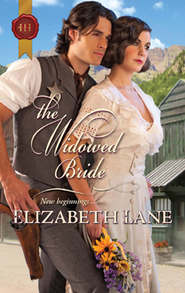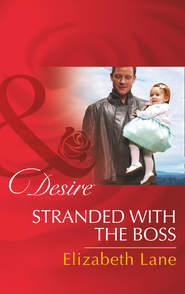По всем вопросам обращайтесь на: info@litportal.ru
(©) 2003-2024.
✖
Navajo Sunrise
Настройки чтения
Размер шрифта
Высота строк
Поля
“Diggings? You mean to say they’re miners?” Miranda asked, trying to imagine what might lie beneath such barren, lime-encrusted earth.
“Miners? Them Injuns?” The young driver snorted contemptuously. “Shucks, no. They dig themselves holes in the ground to keep out of the weather—lessn’ they can find some old hides or sheets of tin to put up for a shack. Why should the lazy buggers mine or farm or even hunt when they can live on handouts from the good old United States Government?”
“You mean, they have no houses? No means of employment?” Miranda asked, horrified.
“Hell—” the young man swore, then broke off and began again. “’Scuse me, miss, but they’s Navajos. An’ Navajos got their own ways of doin’ things. General Carleton, afore he got his butt—’scuse me again, miss—afore he was dismissed from runnin’ this place, he got the idea of havin’ ’em build big adobe apartment houses like the Pueblos got. Right smart idea, if you ask me. But the Navajos, they wouldn’t have none of it. Wanted to live apart in their own kind of houses, little round huts they call hogans. Finally Carleton just threw up his hands and told ’em to go ahead! But did they build any hogans? Did they build anything a’tall? Look around you!”
The corporal worked his tobacco out of his cheek and spat over the edge of the wagon. “Only thing Navajos is any good at is forgin’ fake ration tokens so they can steal more supplies! Now that Carleton’s gone there’s been talk of movin’ ’em out, most likely to the Injun Territories in Oklahoma. Good riddance, I’d say. But nobody’s holdin’ their breath for that, I tell you, ’specially now that the Injun Bureau’s took ’em over from the army. Danged government bureaucrats won’t do much more’n hand out more flour and blankets.”
“But what a wretched way for people to live!” Miranda exclaimed in genuine horror. “No work, no homes, no dignity! Surely someone could help them, teach them—”
“Beggin’ your pardon, miss, but the Navajos brought their troubles on theirselves. They was raidin’ and murderin’ over half of Arizona afore Kit Carson and his boys brought ’em to heel an’ marched the lot of ’em here to Bosque Redondo.”
“Bosque Redondo?” Miranda frowned. “That means round grove in Spanish, doesn’t it? I certainly don’t see any grove in these parts!”
The corporal snorted with laughter. “Weren’t no more than a few trees to begin with, and the Navajos cut those down for firewood the first winter. Now there’s no shade in summer and nothin’ to burn when it gets cold. Never think past tomorrow, them murderin’ redskin fools. If you ask me, Carson shoulda killed ’em all while he had the chance!”
Miranda pulled her cloak tighter about her shoulders, willing herself to ignore the young driver’s unsettling talk. It would not do for her to get caught up in this Navajo business, she lectured herself. She had come to New Mexico to spend the holidays with her father, the last time they would be together before her June wedding, perhaps the last time ever. Nothing could be allowed to spoil their time together.
“There. Told you we’d be seein’ ’em soon.” The corporal’s nasal twang cut into her thoughts. Miranda leaned forward on the wagon seat. She shaded her eyes and scanned the horizon, expecting mounted savages to come whooping over the next rise. Only when the corporal nudged her arm and pointed sharply to the left did she realize her first Navajo was little more than a stone’s throw away.
Miranda turned, looked—and felt her heart contract with pity.
The old Navajo woman stood in the dust at the roadside, her withered body outlined against the blazing vermilion sunset. The desert wind whipped her faded rags against her bones, and the imploring hands that stretched upward like the thin branches of a winter tree shook with age and cold.
“Stop!” Miranda seized the corporal’s arm. The outriders swiveled their heads at the sound of her voice. They slowed their mounts, but did not halt.
“Didn’t you hear me?” Miranda tightened her grip, demanding the corporal’s attention. “I said stop the wagon! We’ve got to do something!”
His washed-out eyes stared at her blankly. “Do somethin’? For her, you mean? Lawse sake, miss, what for? That ain’t nothin’ but a dirty old squaw.” He spat another stream of tobacco over the side of the still-moving wagon. “Anyhow, we got to get you to the fort afore nightfall, or your pa will be fixin’ to throw us all in the stockade!”
He lifted the reins to slap them down on the backs of the plodding mules, but Miranda, anticipating the move, lunged forward, snatched the leather lines from his grip and jerked the team to an abrupt halt.
“What the hell—” the corporal sputtered.
“She’s not just a dirty old squaw. She’s a human being, and she needs help!” Miranda declared. “As for you and your fellow soldiers, if you don’t want to get involved, the least you can do is stand back and allow me to do what I can!”
The outriders had stopped now, and turned their mounts. They watched with varying degrees of amusement as Miranda lifted the skirt of her gray serge traveling suit and clambered down, unassisted, from the buckboard. None of them, it appeared, had the manners to help her or the compassion to aid a fellow being in need.
Over the past four years Miranda had read newspaper articles about the Navajos and how they’d been rounded up and force-marched from their homeland to the bleakness of Fort Sumner. But only now, at her first sight of a real Navajo, did the words she’d read take on life and meaning. In one shriveled face and a pair of twisted, begging hands, she saw the misery of an entire people. It tore at her heart and fueled her sense of outrage to a fever pitch.
The wispy-haired crone was clad in the remnant of a coarse woolen shift, handwoven in a striped pattern that might once have been colorful but was now faded and dirty, showing patches of warp where the weave had worn away. She shrank into herself as Miranda approached, her bare arms folding inward like the legs of a frozen insect. The small mewling noises she made scarcely sounded human.
“It’s all right, I won’t hurt you,” Miranda murmured, edging closer. She could see terror in the raisin-black eyes, and something else—something so disturbing that her heart crept into her throat.
“Give me those leftover biscuits from lunch,” she said softly, glancing up at the corporal in the wagon. When he hesitated, her eyes narrowed so sharply that he lunged to do her bidding. As the daughter of his commanding officer, Miss Miranda Howell was not without power.
Seconds later the biscuits were in Miranda’s hands. “Here, take them.” She held the food at arm’s length, standing quietly as the old woman crept toward her like a frightened, starving animal. “It’s all right,” Miranda urged gently. “No one’s going to hurt you.”
“I’d back off if I was you, miss.” One of the outriders spoke into the windy silence. “I know that old squaw. Crazy Sally, they call her. Hear tell she lit into a soldier one time and bit him on the arm. Tore him open so bad he needed stitches from the medic. No tellin’ what she might do to you.”
Miranda swallowed a knot of uneasiness as she chose to ignore the man’s warning. “It’s all right, Sally,” she coaxed, even more gently than before. “We don’t mean you any harm. Just take the food.”
Madness flashed in the ancient eyes as the old woman sidled closer. With a sudden move she snatched the biscuits away with her little clawed hands and scampered to the shelter of a dark sandstone outcrop. There she squatted on her haunches, glaring at Miranda while she stuffed the biscuits frantically into her near-toothless mouth. Saliva, mixed with soggy white crumbs, trickled down her chin. Miranda found herself wondering how Crazy Sally could have bitten anyone, let alone inflicted serious damage.
“All right, miss, you done it,” the wagon driver said. “You proved whatever you wanted to prove. Now let me give you a hand up and we’ll be headin’ on to the fort. You don’t want to be out here after dark.”
Miranda glanced up at him, still hesitant. The early spring wind, tasting of snow, plucked tendrils of her light brown hair and whipped at the folds of her woolen cloak as she turned back toward the old woman. Crazy Sally was still crouched against the rocks, her small black eyes narrowed to slits against the blowing dust.
“For the love of Pete, what is it now?” the wagon driver demanded.
Miranda’s eyes took in the old woman’s threadbare dress and exposed limbs. “We can’t just go off and leave her. There’s a storm blowing in. She’ll freeze before morning. Help me get her into the wagon. We’ve got to take her back to the fort.”
None of the soldiers moved.
Miranda’s gazed darted from one impassive face to the next. Some of the men averted their eyes, avoiding her furious gaze. Most of them did not bother. Had she pushed them too far this time?
“Beggin’ your pardon, miss.” The first outrider spoke up at last. “Ain’t none of us goin’ to lay a hand on that old squaw, let alone put her in the wagon.”
“If she ain’t got the sense to take shelter, let ’er freeze,” the corporal chimed in. “Good riddance to one more Navajo, that’s what I’d say. It’s what we’d all say.”
Miranda glared up at him in helpless rage. Phillip, her fiancé, had once accused her of being a flaming do-gooder who never knew when to leave well enough alone. He was undoubtedly right. Even so, she could not just walk away and leave a fellow human being to die.
“Very well.” She squared her shoulders and folded her arms across her chest. “If Sally stays here, then so do I. You can tell my father—”
“The major would hang us if we was to go off and leave you here,” the outrider interrupted. “We got orders to bring you safely back to Fort Sumner. With all due respect, miss, if we have to hogtie you and toss you in the wagon bed, that’s exactly what we’ll do.”
Miranda’s heart sank as she realized she had backed herself into an impossible corner. If she refused to get in the wagon, it would be an easy matter for nine men to move her by force. And, given the circumstances, her father would likely excuse their actions.
Her shoulders sagged in acquiescence. But there was one small victory yet to win, one last thing she could still do for poor old Sally, and this time, she vowed, no one was going to stop her.
Lifting her chin in defiance, she began unbuttoning the front of her long, hooded cloak. A birthday gift from Phillip’s family, the cloak had been woven in France from the finest blue merino wool and had likely cost a small fortune. Even now, the lush fabric caressed her fingers as she worked the buttons through their satin-bound holes. The wind was numbing in its chill. But she would be at the fort within the hour, Miranda reminded herself. And she could always buy another cloak, just as warm if not as elegant.
She waited for the soldiers to protest, but none of them spoke as she released the last button and slid the cloak off one shoulder. By now they probably thought she was as crazy as old Sally. Well, let them think whatever they wished. She would do the right thing, the moral thing, and the whole contemptuous lot of them could go to blazes.
The icy wind struck, penetrating to Miranda’s bones as the cloak slipped free of her body. She gasped with the sudden shock of it, then forcefully brought her reaction under control. This was no time to show weakness, she lectured herself. If old Sally could endure the cold, so could she.
Clenching her jaw against the urge to shiver, she turned back to the old woman, opened the cloak and wrapped it around the ravaged body. The garment was far too large for the tiny Navajo crone. Its elegant folds pooled around her where she squatted on her bony haunches, the lining already gathering dust. In no time at all the beautiful cloak would be filthy. But at least Sally would be warm. Heaven willing, she would survive the cold night with its blowing wind and snow, and many more nights to come.
“And just what do you think you’re doing?”
The voice was not loud, but its deep resonance, coming from behind and above her, made Miranda gasp. She turned so sharply that she lost her balance and stumbled to one side, wrenching her ankle. She caught herself against a jutting boulder, just managing to avoid an all-out sprawl.
“I asked you what you thought you were doing.” The voice was laced with a fury so cold that it made the raw wind seem as gentle as a southern breeze. Still clinging to the rock, Miranda looked up to see a tall, mounted figure, starkly outlined against a sky that had deepened to the color of flowing blood.
The man was not a soldier—that much was clear at once. He was hatless and swathed in a long, fringed poncho that swirled around him in the stinging wind. Only when his horse snorted and turned, the new angle flooding his features with crimson light, did Miranda see the high, jutting cheekbones, the obsidian eyes, the long raven hair, bound with string into a knot at the back of his head. Only then did she realize he was Navajo.
And for all his angry tone, he had just spoken to her in very passable English.











